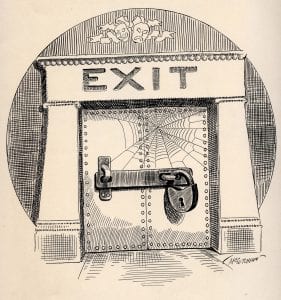
Each time we face our fear, we gain strength, courage, and confidence in the doing. Ralph Waldo Emerson
Why I Keep Losing Money In The Stock Market: Lessons from Legendary Investors
April 1, 2024
Investing in the stock market requires discipline, knowledge, and emotional control. As Jacob Fugger, the wealthiest man of the Renaissance era, once said, “The secret to success is to rise early, work late, and buy when there’s blood in the streets.” This highlights the importance of staying calm and rational during market downturns.
One of the main reasons investors lose money is a gambler’s mindset. They chase riches instead of seeking them patiently. Nathan Mayer Rothschild, the founder of the English branch of the Rothschild banking family, famously stated, “The way to make money is to buy when blood is running in the streets.” This emphasizes the need to invest when others are fearful and to avoid getting caught up in market euphoria.
Examples of successful investors who followed these principles include:
1. Warren Buffett: He is known for his patient, value-oriented approach to investing and his ability to control his emotions during market turbulence.
2. George Soros: In 1992, he made a billion dollars by shorting the British pound, demonstrating the importance of conviction in one’s investment thesis.
To avoid losing money in the stock market, investors should:
1. Develop a long-term investment strategy and stick to it.
2. Diversify their portfolio across different asset classes and sectors.
3. Conduct thorough research before making investment decisions.
4. Avoid letting emotions dictate your actions.
As Fugger demonstrated through his social housing project, the Fuggerei, successful investors also understand the importance of giving back to society. By adopting the mindset and strategies of legendary investors like Fugger and Rothschild, one can navigate the stock market with tremendous success and avoid the pitfalls that lead to financial losses.
Losing in the markets can become a thing of the past, but the first step is changing how you perceive the markets. You should pose this question if you have lost money in the market. Why do I keep losing money in the stock market? Because you have a gambler’s mindset
Mastering the Market: Overcoming Media Manipulation and Emotional Pitfalls
In the wise words of Warren Buffett, “The most important quality for an investor is temperament, not intellect.” Emotions have no place in investing, often leading to irrational decisions. To succeed in the market, one must act contrary to what these emotions dictate.
As legendary Benjamin Graham once said, “The intelligent investor is a realist who sells to optimists and buys from pessimists.” Riches come to those who seek opportunities patiently, not to those who chase them impulsively. The market rewards the disciplined and punishes the greedy.
Media manipulation adds to the emotional turmoil. Negative news about wars, budget deficits, inflation, and market meltdowns can create a sense of panic. However, as the renowned economist John Maynard Keynes noted, “The market can stay irrational longer than you can stay solvent.” Investors must learn to filter out the noise and focus on the fundamentals.
The philosopher René Descartes famously stated, “I think, therefore I am.” In investing, the thought process is crucial. Remove the thought, and there is no thinker; the idea makes the thinker. Investors must develop a rational, long-term mindset and stick to their strategies, even in market volatility.
Examples of successful investors who have mastered their emotions include:
1. Charlie Munger: Warren Buffett’s right-hand man is known for his rational, patient approach to investing and ability to avoid the herd mentality.
2. Sir John Templeton: The founder of the Templeton Growth Fund famously bought shares of every company trading below $1 per share on the New York Stock Exchange in 1939, just after World War II began, and made a fortune.
Overcoming media manipulation and emotional pitfalls is key to mastering the market. By seeking opportunities patiently, filtering out the noise, and developing a rational mindset, investors can navigate the market’s challenges and achieve long-term success. As the philosopher Lao Tzu said, “The journey of a thousand miles begins with one step.” Take that first step towards mastering your emotions and the market today.
Mastering Emotional Intelligence: Overcoming Market Manipulation for Financial Success
When it comes to investing, there is no place for emotions; in fact, emotions are useless unless you are in a flight or fight situation. To invest in the market successfully, you must understand that you must do precisely the opposite of what these useless emotions are prompting you to do.
Emotional intelligence trumps impulsive reactions in investing. Emotions, often useless in financial decisions, can lead to detrimental outcomes. Riches come to those who seek them and not those who chase them. To those who pursue it, rags are the only reward. The oyster can be your world, or you can be an oyster in the world. One must get a firm grip on their emotions to succeed in the market. There is no place for any extreme deviation from the norm when it comes to investing, and euphoria and panic are extreme deviations from the norm.
Maintaining a sense of humor can provide solace amidst a backdrop of negativity and uncertainty. Yet, removing the thinker from the thought reveals the intrinsic power of ideas.
Remove the thought, and there is no thinker; the idea makes the thinker.
Why is it that we say I am going to do this from the bottom of my heart, why not from the top of our hearts? Could it be that we don’t want to give it all we have, so we do it from the bottom?
Delving into why we lose money in the stock market, we encounter formidable adversaries: fear, Euphoria, and Indecisiveness. Understanding and harnessing these forces, flipping the script to fear what the masses do not and embracing what they fear is paramount for financial mastery.
Conclusion
Remember the saying, “Misery loves company, but stupidity simply adores it”. The masses always dump when they should be buying and buy when they should be selling. In this world, it’s not what you know that can hurt you. It’s what you think you know that can hurt you the most.
The influence of emotions on investment decisions is a significant factor contributing to the crowd’s losses in the stock market. Behavioural finance research has shown that fear and greed can lead to poor investment choices, such as selling during market drops or buying at the top. The emotional cycle of investing often results in the masses buying when they should be selling and selling when they should be buying.
As the renowned investor Benjamin Graham once said, “The investor’s chief problem—and even his worst enemy—is likely to be himself.” Emotions can cloud judgment and lead to irrational decisions, which is why successful investors like Warren Buffett emphasize the importance of emotional discipline. Buffett famously advised, “Be fearful when others are greedy, and greedy when others are fearful.”
The media also plays a role in shaping investors’ emotions and self-concept. Studies have shown that the stories we hear and the ideals promoted by the media can influence our self-identity and self-perception
When the media focuses on negative news, such as market crashes or economic downturns, it amplifies fear and leads to panic selling. Investors must develop a strong sense of self and a rational, long-term mindset to overcome these emotional pitfalls. This involves building self-esteem through positive relationships and connections with others and being aware of the media’s impact on our emotions and decision-making processes.
Examples of successful investors who have mastered their emotions include:
Charlie Munger: Known for his rational, patient approach to investing, Munger has said, “The whole secret of investment is to find places where it’s safe and wise to non-diversify. It’s just that simple.”
Sir John Templeton: Templeton famously bought shares of every company trading below $1 per share on the New York Stock Exchange in 1939, just after World War II began, and made a fortune. He once said, “To buy when others are despondently selling and to sell when others are avidly buying requires the greatest fortitude and pays the greatest ultimate rewards.”
In the words of the Stoic philosopher Epictetus, “It’s not what happens to you, but how you react to it that matters.” By mastering their emotions, filtering out media noise, and focusing on long-term, rational decision-making, investors can navigate the challenges of the market and achieve enduring success. As the Chinese proverb states, “The best time to plant a tree was 20 years ago. The second best time is now.” Start your journey towards emotional mastery and investment success today.
The two most powerful warriors are patience and time.
Leo Nikolaevich Tolstoy Quotes
Compelling Articles for the Thoughtful Reader

Exploring AI and Human Intelligence Synergy

Happiest Countries In The World: America Falls Short of the Mark

The Cholesterol Hoax: Unveiling the Hidden Truth

Watching Porn Affects Marriage & Wealth

How to Build Wealth in Your 40s ?

Sleep Gender Disparity: Do Women Require More Rest

Navigating the Future: Robot and Human Interaction in the Age of AI

AI trends: The Future is all About AI?

College Debt: Graduates’ Luxury Habits Amidst Struggle

U.S. Government Lies: Unveiling 22.9% Real Unemployment

Exploring AI Future Trends: What Lies Ahead

What Is Financial Freedom: Winning the Investing Game

Donald Trump’s Agenda For 2020 and Beyond

Unveiling the Health Elixir: Drinking Olive Oil Benefits

Iran War: Unraveling Pandora’s Box
Negative Thinking: How It Influences The Masses



So obviously the best time to have bought was before it really did anything, wait for the 2nd high, then sell high? Is that a general strategy? Does this graph show an average for how stocks seem to go? I’m a total newb, which is why I ask.